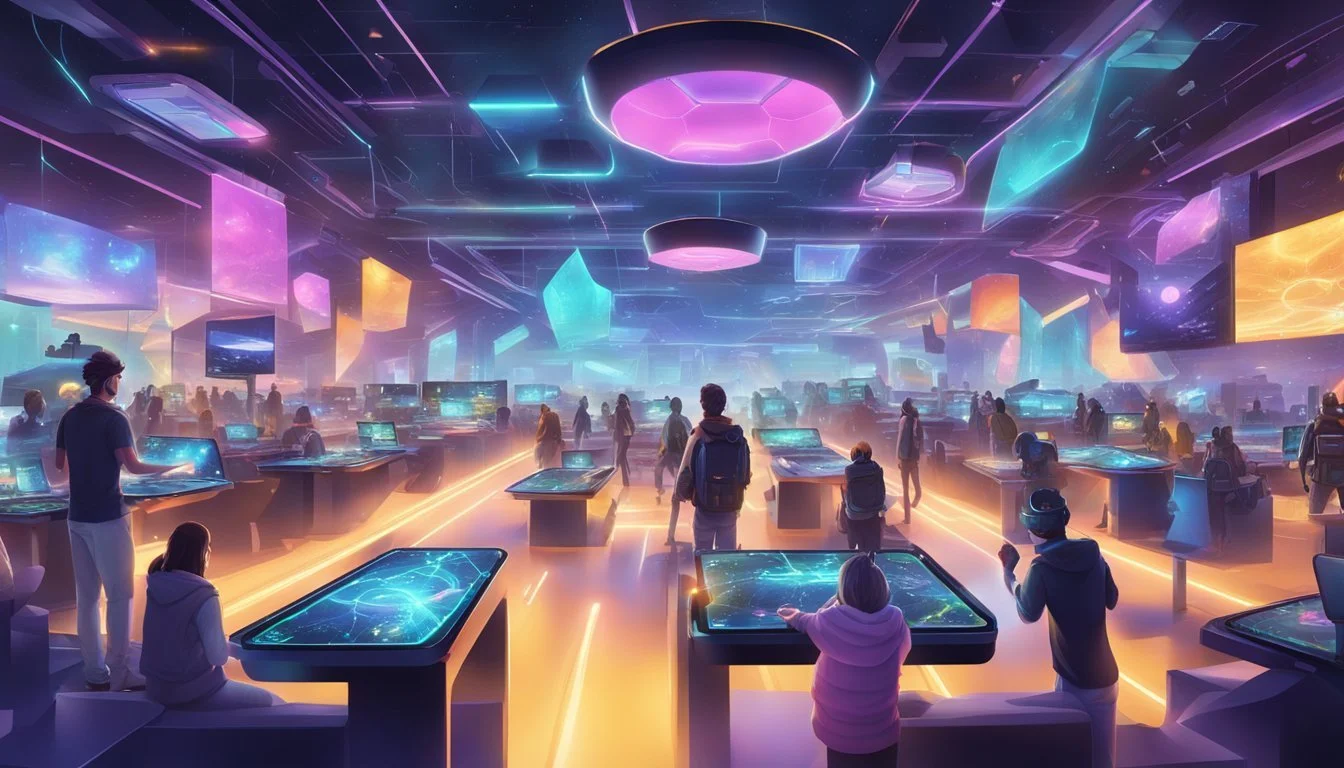Metaverse Gaming Evolution: Next-Gen Interactive Worlds Unveiled
The concept of the metaverse has been a game-changer for the digital landscape, intertwining virtual realities with our physical world in a seamless, immersive experience. At the forefront of this digital revolution, gaming platforms have been pivotal, expanding beyond mere entertainment to become gateways to vast, interactive worlds where the lines between digital and physical start to blur. In the metaverse, games transcend traditional boundaries, allowing thousands of players to interact simultaneously in persistent environments that promise to redefine engagement and social interaction.
The metaverse isn't confined to a single digital space or platform; it's an interconnected network that spans various devices and virtual realms, each contributing to a more extensive, cohesive universe. Reflecting the early ambition of the internet to connect people regardless of physical distance, the metaverse extends this notion to a level where collaborative and competitive gaming experiences can emerge organically. As these platforms evolve, they promise to deliver use cases that go well beyond gaming, potentially influencing sectors like education, commerce, and social networking.
Gaming industries and technology leaders recognize the potential of the metaverse, driving innovations that could elevate gaming to unprecedented heights. This new dimension of gaming is not only reshaping how players interact with virtual environments but also how they connect with one another, forging communities and shared experiences in ways that were once the domain of science fiction. As this digital universe continues to mature, the implications and opportunities within the metaverse seem limitless, heralding a new era where gaming could play a central role in the evolution of the internet itself.
The Rise of the Metaverse in Gaming
The gaming industry is witnessing a transformative era with the emergence of the metaverse, reinventing how players interact within virtual worlds through the use of technologies like virtual reality (VR) and augmented reality (AR).
Evolution of Virtual Worlds
Virtual worlds have evolved from simple 2D platforms to complex 3D environments powered by advanced artificial intelligence (AI) and blockchain technologies. These digital landscapes offer users an opportunity to immerse themselves in virtual realms where they can interact as avatars. Companies like Roblox and Epic Games, the creator of Fortnite, have laid the groundwork for what is often described as the proto-metaverse, a precursor to a fully-fledged metaverse experience.
Impact on the Gaming Industry
The integration of metaverse concepts is significantly impacting the gaming industry. It allows for persistent online spaces where players' actions have lasting consequences. For instance, virtual economies created within these worlds are often facilitated by blockchain, enabling secure and transparent in-game transactions. Additionally, the use of AR and VR technologies in gaming has led to more immersive experiences, allowing players not only to view content but to step inside it, shaping the environment through their interactions.
Technological Foundations
The metaverse and gaming industry are rapidly evolving, propelled by significant advancements in technology. Key to this evolution is a trinity of areas: hardware innovations, software development horizons, and networking and connectivity, each providing a critical foundation for the immersive experiences expected in the next-generation digital universe.
Hardware Innovations
In the realm of Virtual Reality (VR) and Augmented Reality (AR), device enhancements play a crucial role. Modern VR headsets are becoming increasingly lightweight, with higher resolutions and faster refresh rates, leading to more vivid and realistic environments. Similarly, AR devices, such as sophisticated smart glasses, merge digital content with the physical world seamlessly. Important metrics like RAM are scaling up to manage the complex processes without lag, improving not only the user experience but also expanding capabilities for developers.
Software Development Horizons
The software sector is witnessing a paradigm shift with the advent of three-dimensional world-building platforms that leverage the power of cloud computing. These platforms offer robust and scalable infrastructure necessary for creating expansive and interactive virtual spaces. Cloud computing also ensures that users can access these worlds from a range of devices without the need for high-end local hardware, thus democratizing access to the metaverse.
Networking and Connectivity
For an uninterrupted experience in the metaverse, 5G technology is proving to be transformative. It significantly reduces latency to nearly imperceptible levels, facilitating real-time interactions that are critical for both gaming and social experiences within the metaverse. Enhanced networking and connectivity infrastructure supports the high bandwidth demands of persistent virtual worlds, ensuring that activities within the metaverse unfold in a consistent and reliable manner.
Gaming Platforms and Ecosystems
In the competitive landscape of digital gaming, platforms serve as battlegrounds for innovation, with leading tech giants and niche players all vying for dominance. Partnerships become critical for expansion, while new platforms continuously emerge, specializing in various aspects of the gaming experience.
Major Players and Partnerships
Meta, formerly known as Facebook, is a titan in the gaming ecosystem, leveraging virtual reality (VR) technologies to shape the fabric of the metaverse. Their acquisitions, such as Oculus, play a key role in their strategy to offer immersive gaming experiences. Moreover, Microsoft has strengthened its gaming proposition through its cloud platform, Azure, and gaming service, Xbox Game Pass, integrating cloud gaming to reach more users. They also have Teams, which, although not a gaming platform, shows Microsoft's prowess in creating platforms that can support intricate ecosystems.
Prominent partnerships in the industry power the development and distribution of exclusive titles and tech innovations. For instance, console manufacturers like Sony and Microsoft often collaborate with game developers to enhance their console ecosystems, bringing exclusive games and features to their respective platforms, the PlayStation and Xbox.
Growth of Niche Platforms
Outside the realm of established behemoths, niche platforms are carving their own space in the gaming market. These platforms often focus on specific genres or gaming experiences that are not the primary focus of larger platforms. For example, cloud gaming services like NVIDIA's GeForce Now and Google Stadia arose to untether gameplay from traditional hardware constraints.
At the Consumer Electronics Show (CES), numerous innovations in gaming technology are unveiled, often giving a boost to niche platforms by providing them with the latest tech to compete in the market. These events are critical junctions where smaller platforms can gain visibility and form strategic partnerships to enhance their offerings.
Virtual Reality and Augmented Reality
Virtual Reality (VR) and Augmented Reality (AR) technologies are pioneering a transformative experience in gaming, enhancing digital identity and customer satisfaction through immersive virtual environments and overlaying digital content onto the physical world.
The VR and AR Experience
Virtual reality offers a fully immersive experience where users can interact within a completely virtual environment using VR headsets. Games developed for VR provide a sense of presence that traditional gaming cannot match, featuring three-dimensional environments that react to users' movements. In contrast, augmented reality enhances the real world by superimposing digital information and images, using devices like smartphones or AR glasses, thus merging the physical and digital worlds in real time.
Virtual Reality:
Immersive digital environments
Interactive, user-centric experience
Requires dedicated VR devices
Augmented Reality:
Overlay of digital content on the real world
Can be accessed through various platforms, including mobile and wearable tech
Enhances reality, without replacing it
Consumer Accessibility
The accessibility of VR and AR technologies plays a crucial role in customer satisfaction. VR devices have become more user-friendly and affordable, expanding their reach to a broader customer base. Mainstream VR gaming headsets, such as those produced by the likes of Meta's Quest series, push the envelope in consumer VR experiences. Meanwhile, augmented reality is often more readily available to consumers through applications on smartphones and tablets that do not require additional hardware.
VR Devices:
Range of options, from budget-friendly to high-end
Increasingly wireless with better battery life and resolution
AR Accessibility:
Widespread through mobile apps
Integrates with existing devices, lowering the barrier to entry
By leveraging VR and AR, gaming is set on a trajectory that promises to revolutionize not only entertainment but also the way consumers engage with digital content, interact with each other, and even perceive their own digital identity.
Monetization and Digital Economy
The intersection of gaming in the metaverse and modern finance has given rise to sophisticated monetization strategies involving digital currencies and assets. These innovations are redefining value creation and exchange in virtual spaces.
Cryptocurrencies and NFTs
Cryptocurrencies serve as the foundational currency for many metaverse platforms, enabling users to carry out transactions seamlessly. NFTs, or non-fungible tokens, represent unique digital assets that can range from in-game items to virtual real estate, effectively acting as deeds of ownership recorded on the blockchain. Both have become pivotal in:
Creating new revenue streams for game developers.
Providing gamers with collectibles that potentially appreciate in value.
Facilitating a decentralized economy that extends beyond games.
Smart Contracts and Digital Assets
Smart contracts are self-executing contracts with the terms of the agreement directly written into code. They play a crucial role in the metaverse by:
Enforcing the terms of sale and ownership of digital assets.
Creating trust in transactions without intermediaries.
Allowing for complex economic interactions within virtual worlds.
The digital assets bought and sold through these contracts can include anything from virtual clothing to weapons, with blockchain technology ensuring authenticity and provenance.
Gaming Experience and Interactivity
As the gaming industry evolves, the emerging metaverse is significantly enhancing player interactivity and the overall gaming experience. Players can now engage with virtual worlds in ways that are more dynamic and immersive, marking a shift in how games are played and experienced.
Avatar Customization
Avatar customization stands at the forefront of personal expression within the metaverse. Gamers are provided with extensive tools to create their unique digital personas, which can range from realistic depictions to fantastical creations. This personalized representation is not just a visual aspect; it extends to embodying a player's style and even their movements within the game. Such detailed customization allows for a more personal connection with the game world and facilitates deeper social interaction among players.
Conducting Virtual Events
The metaverse also opens up new dimensions for virtual events, from interactions during a virtual concert to sprawling in-game meetups. These virtual experiences serve as a hub for gatherings that mirror real-life events but are conducted in a virtual space, allowing gamers from across the globe to participate without the constraints of physical distance. In these settings, avatars are not just players but become attendees and active participants, offering a level of engagement and interactivity previously unseen in digital spaces.
Security, Privacy, and Governance
As the metaverse intertwines with gaming, issues of security, privacy, and proper governance become paramount, given the vast array of digital assets that users will want to protect in a space that transcends the traditional boundaries of the internet.
Protecting Digital Assets
Digital assets in the metaverse, such as in-game items or virtual real estate, represent significant value to users. Ensuring their security hinges on robust authentication protocols and encryption methodologies. For example, the implementation of two-factor authentication can significantly mitigate unauthorized access to a user's assets. Meanwhile, technologies like blockchain provide a decentralized and transparent ledger that enhances the integrity of digital transactions, making them less susceptible to fraud.
Regulatory Frameworks
The dynamic nature of the metaverse compels the creation of innovative regulatory frameworks to safeguard user privacy and ensure fair governance. Recently published recommendations for metaverse governance suggest the need for a theoretical basis for these frameworks, focusing on the economics of standards and relevant theories. Legislative bodies might draw on existing internet regulations as a starting point, adapting them to fit the unique needs of virtual worlds where physical and digital interactions converge.
Social Dynamics and Gaming Communities
As the digital landscape evolves, the metaverse and gaming have become catalysts for profound social dynamics and community-driven experiences. Gamers are coming together in virtual environments, transforming social interaction and community engagement, especially within the esports arena.
The Role of Esports
Esports have ascended from niche online competitions to full-blown, stadium-filling cultural phenomena. They serve as a cornerstone for community building within the gaming universe. Players and fans unite around their favorite games, forming communities that extend beyond geographical boundaries. These communities often engage in community-driven events, which are becoming increasingly popular, offering a sense of belonging and shaping the social architecture of the metaverse.
Interaction: Online tournaments facilitate social interaction among participants, creating a shared experience that is both competitive and communal.
Growth: Esports audiences are rapidly growing, reflecting an expanding global engagement with gaming as a spectator as well as participatory activity.
Community Building and Engagement
Community building within the metaverse is critical for sustaining a vibrant gaming ecosystem. Game developers and companies recognize the importance of fostering strong communities to enhance the gaming experience. Community engagement strategies are fundamental to this effort, with game platforms actively facilitating ways for users to connect, share, and collaborate.
Tools for Engagement: Platforms offer tools such as chat systems, forums, and in-game events to encourage interaction and deepen the social connections between players.
Impact of Community: A testament to the influence of community is the focus on user-generated content, empowering gamers to contribute to the game worlds they inhabit, leading to a richer, more personalized experience.
As the boundaries between the real and digital worlds blur, the social dynamics within gaming communities continue to evolve, becoming an indelible part of the metaverse narrative.
Future Trends and Predictions
The dynamic landscape of gaming is continually reshaped by advancements in technology, with artificial intelligence (AI) and emerging innovations at the forefront, promising to build deeply immersive experiences in virtual environments.
The Role of Artificial Intelligence
Artificial intelligence is set to deepen player immersion by powering sophisticated non-player characters and adaptive environments. AI will facilitate dynamic storytelling, adapting narratives in real-time to players' actions and decisions, effectively crafting personalized experiences. Within this context, gaming is expected to evolve beyond predefined scenarios, becoming an ever-changing landscape influenced by player behavior and AI intervention.
Emerging Technologies and Innovations
In the realm of emerging technologies, augmented reality (AR) and virtual reality (VR) are poised to offer more compelling and interactive experiences. Innovations like haptic feedback suits and advanced VR headsets will augment the sense of presence within these virtual environments. Data from reliable industry sources anticipates a significant economic impact from these technologies, with new revenue models emerging in gaming, education, and e-commerce, transforming the way value is created and exchanged in the metaverse.





